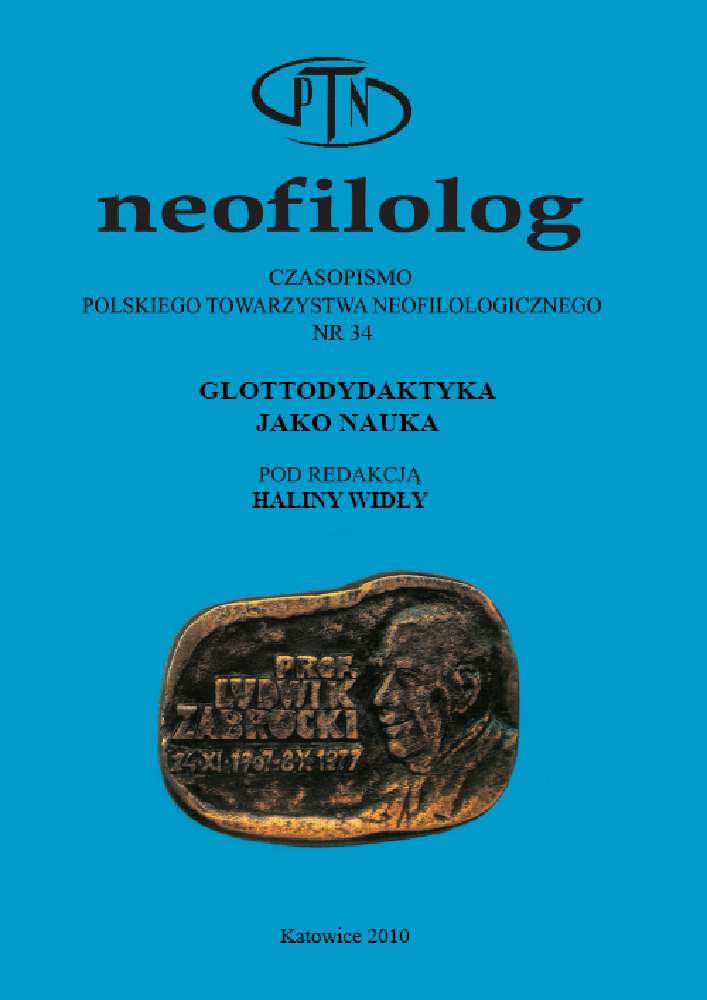Résumé
In this pilot study, a group of students were asked to generate metaphors on the role of the teacher and the learner and learning and teaching. Then the questionnaire data were compared with student metaphors elicited in oral interviews. The results suggest that sentence completion does not reflect informants’ true convictions, and that in contrast to theoretical assumptions, novel metaphors seem to be more consistent than conventional metaphors.
Références
Cameron, L. i G. Low. 1999. Researching and Applying Metaphor. Cambridge: Cambridge University Press.
Cieślicka, A. 2002. “Metaphors of teaching and learning: Investigating bilingual metaphorical competence” (w) PASE Papers in Language Studies (red. D. Stanulewicz). Gdańsk: Wydawnictwo Universytetu Gdańskiego, 383 – 393.
Cortazzi, M i L. Jin. 1999. “Bridges to learning: Metaphors of teaching, learning and language”. (w) Researching and applying metaphor (red. L. Cameron i G. Low). Cambridge: Cambridge University Press, 149 – 176.
Dominiek, S. i S. Rice. 1995. “Network analysis of prepositional meaning: mirroring whose mind – the linguist’s or the language user’s?” Cognitive Linguistics 6 (1), 89 – 130.
Guerrero, M. C. M. de i O. S. Villamil. 2002. “Metaphorical conceptualizations of ESL teaching and learning.” Language Teaching Research 6 (2), 95 –120.
Haser, V. 2005. Metaphor, Metonymy, and Experientialist Philosophy. Berlin, New York: Mounton de Gruyter.
Kövecses, Z. 1986. Metaphors of Anger, Pride and Love: A Lexical Approach to the Structure of Concepts. Amsterdam, Philadelphia: John Benjamins.
Kövecses, Z. 2000. Metaphor and Emotion: Language, Culture, and Body in Human Feeling. Cambridge: Cambridge University Press.
Kövecses, Z. 2002. Metaphor: A Practical Introduction. Oxford: Oxford University Press.
Kövecses, Z. 2008. “Metaphor and Emotion” (w) The Cambridge handbook of metaphor and thought (red. R. W. Gibbs). Cambridge: Cambridge University Press, 380 – 396.
Lakoff, G. i M. Johnson. 2003 [1980]. Metaphors We Live By. Chicago: University of Chicago Press.
Musiał, A. 2002. “Exploring teacher trainees’ metaphors of language teaching. “ (w) PASE Papers in Language Studies (red. D. Stanulewicz). Gdańsk: Wydawnictwo Uniwersytetu Gdańskiego. 463 – 470.
Strugielska, A. 2008. “Coherence relations and concept dynamics in learners’ personal theories”. Vigo International Journal of Applied Linguistics 5, 107 – 129.
Strugielska, A. 2008a. “Metaphorical reflections of learners’ educational experience d. M. Charzyńska-Wójcik, A. Malicka-Kleparska i J. Wójcik). Lublin: Towarzystwo Naukowe Katolickiego Uniwersytetu Lubelskiego Jana Pawła II, 53 – 62.
Werbińska, D. 2005. Skuteczny naucz yciel jęz yka obcego. Warszawa: Fraszka Edukacyjna.
Licence
© Ariadna Strugielska, Krzysztof Strzemeski 1970

Ce travail est disponible sous licence Creative Commons Attribution - Pas de Modification 4.0 International.
Auteurs :
Les auteurs de textes acceptés pour publication dans la revue Neofilolog sont tenus de remplir, signer et renvoyer à l'adresse de la rédaction, un accord sur l'octroi d'une licence gratuite pour les œuvres, avec obligation d'accorder une sous-licence CC.
En vertu de cet accord, les auteurs des textes publiés dans la revue Neofilolog accordent à l'Université Adam Mickiewicz de Poznań une licence non exclusive et gratuite et permettent l'utilisation de la sous-licence Creative Commons Attribution-NoDerivatives 4.0 International (CC BY-ND 4.0).
Les auteurs se réservent le droit de disposer librement de l'œuvre.
Utilisateurs :
Les utilisateurs d'Internet intéressés ont le droit d'utiliser les œuvres publiées à partir de l'année 2017 sous réserve des conditions suivantes :
- reconnaissance de la qualité d'auteur - l'obligation de fournir des informations sur la qualité d'auteur, le titre, la source (liens vers l'œuvre originale, DOI) et la licence, ainsi que l'œuvre distribuée ;
- sans créer d'œuvres dérivées - l'œuvre doit être conservée dans sa forme originale, p. ex. les traductions ou les interprétations ne peuvent être distribuées sans le consentement de l'auteur.
Tous les textes publiés sont soumis au droit d'auteur.
Autres :
L'Université Adam Mickiewicz de Poznań se réserve le droit à la revue dans son ensemble (mise en page, forme graphique, titre, conception de la couverture, logo, etc.).
.
